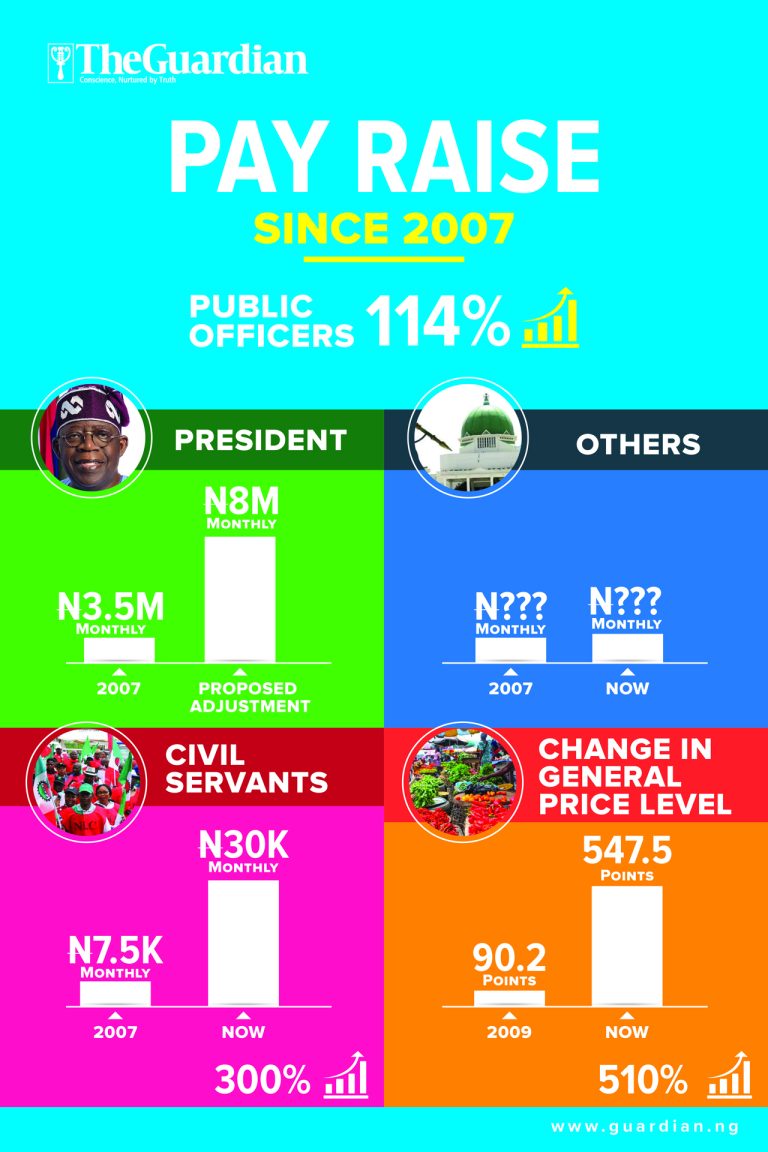Pa J’s Song Additional Mathematics Now More Relevant As Tinubu, Shettima, Other Politicians Get 114% Pay Rise Amid Minimum Wage Tussle With NLC

P J’s Song Additional Mathematics has now become more relevant As Tinubu, Shettima, Other Politicians Get 114% Pay Rise Amid Minimum Wage Tussle With Nigeria Labour Congress (NLC)
Additional Mathematics is one of the most relevant songs from PA J’s 2020 studio project “APPETIZER ALBUM”. Watch Official Music Video at the bottom of this news page which features Nollywood actor Ladi Folarin.
• President to earn N8 million monthly • Public Officials’ pay too high, says Ozo-Eson
• Move is gang up against Nigerian workers, says NLC •TUC: We’ll review our demands in coming days
• Increase minimum wage to N60,000, economist urges government
Amid rising burden of removing subsidy on Premium Motor Spirit (PMS) on civil servants, self-employed, private sector workers and the unemployed, the Revenue Mobilisation Allocation and Fiscal Commission (RMAFC) has proposed to raise the salaries of public office holders by 114 per cent, setting the stage for a more complex minimum wage negotiation process.
The review would increase President Bola Tinubu’s monthly emolument from N3.515 million to N8.013 million. Those of the Vice President, governors and lawmakers would increase accordingly.
Already, economists are recommending N60,000 minimum wage to reduce the disparity in the take-home between public and civil servants, whose incomes have been wiped out by fast-rising inflation.
From 2009 when the current consumer price index (CPI) was set, the general monthly price index has increased by 510 per cent, from 90.2 points to 547.5 points.
Sadly, the national minimum wage has only increased by 300 per cent in the same period, moving from N7,500 to N30,000. In dollar terms alone, Nigerian workers earned more back then than now, with high inflation also doing significant damage to household income.
There is an ongoing negotiation for minimum wage review with organised labour demanding N200,000. The government has not made an offer but advanced what it called cost of living allowance to cushion the effect of subsidy removal on income with the total estimated spending pegged at N702 billion.
While there has been no reasonable progress on the discussion, RMAFC disclosed the review of public officials’ already bloated salaries by 114 per cent yesterday, an announcement that has triggered outrage from civil society and labour.
RMAFC explained that elected public officers have not had a raise in their emoluments since 2007.
In a calm yet angry tone, the immediate past General Secretary of the Nigeria Labour Congress (NLC), Dr. Peter Ozo-Eson, dismissed the argument of 17 years of non-revision of elected public officers’ pay.
He argued that in 2007, the wages of the elected public were already among the highest in the world, which distorted the Nigerian wage structure.
He explained that RMAFC, National Income Wages and Salaries Commission (NIWSC) and Collective Bargaining Agreements (CBAs) have been made non-effective by the distortions, saying: “There is complete dissociation between what the RMAFC does for the so-called public officers and what the other income determination mechanisms do either through the national salaries and income wage commission or what the collective bargaining does for the rest of the public sector and the private sector.”
He held that the widening gap between what is paid to elected public servants and what is paid to civil servants has been responsible for the clamour for wage increases in the country.
While lampooning the kleptocratic nature of some Nigerian elected public officers, Ozo-Eson submitted that studies have shown that at the level of international comparison what is being paid to the Nigerian public officers outstrips what is paid to many other countries’ officials.
Given the harsh economic policies this government has introduced that have eroded the pay of workers significantly, raising workers’ pay was a chance to bridge the gap between elected officers and other workers in the country.
Ozo-Eson said: “The situation we had was that the remunerations of elected officers were set higher than the prevailing wage structure relative to the rest of the economy. Even if we had had reviews of the minimum wage twice or more within the period, it is still far short of what those levels are and that is what has been responsible for the continued clamour that we need to bring the salary structure to be in line with what is realistic.”
Proffering solutions to the intractable wage structure question, he urged that government, at all levels, labour unions and employer bodies to develop a just and sustainable system.
His words: “I think what needs to be done is to sit down and do a proper alignment of what the compensation for the whole economy should look like. Doing a percentage review when there is a completely misaligned structure will not address the problem. We will continue to have a situation in which elected public officers’ pay will continue to be out of alignment with the rest of the economy and that will continue to act as a catalyst for unstable remuneration demands in the rest of the economy.”
Also, Assistant General Secretary of the NLC, Chris Onyeka, said the move was a gang-up and a height of deceit by the government against Nigerian workers.
Analysing the figures, he said: “Looking at the base that they are increasing by 114 per cent against their humongous salaries and 30,000 for civil servants. 114 per cent of their base will run into millions and if you increase N30,000 minimum wage by 114 per cent, it will increase to N65,000. That is why we are asking for an increment in quadruples. If we want to make something tangible for us, the minimum wage should be around N250,000, which is about $300 monthly.
“What is $300 compared to the cost of living comparatively? We are talking about what will take Nigerian workers home. We must reduce the cost of governance to free resources.
“Governors do not need their salaries to be increased for now because they do not touch their salaries.”
First Deputy President of the Trade Union Congress of Nigeria (TUC), Dr. Tommy Okon, said the government has set a template for their negotiation and discussions for increased allowances. He said the government has set a standard and they would follow suit.
He said by Monday when the Presidential Proposal Steering Committee would meet, labour would also review their demands and table them according to what has been submitted.
Okon, who is also the National President of the Association of Senior Civil Servants of Nigeria (ASCSN), said there should be no cause for alarm or outrage but for them to follow accordingly.
He said when the time comes for negotiations for the review of the national minimum wage, they’ll also follow suit as the government has set the template.
An economist and Chief Executive Officer of the Centre for the Promotion of Private Enterprise (CPPE), Dr. Muda Yusuf, said the government needed to look at the mood of the nation, especially what the citizens are currently going through, before making such an announcement.
He said the message Nigerians needed now was that of sacrifice.
According to him, the need to accelerate efforts on palliatives was paramount, not just for salary earners only but all Nigerians: “Something that will affect everyone, which by now the government should be announcing. Even if it has not crystallised at least people know that something specific is on the way.”
On his part, Chief Executive Officer of Dairy Hills Limited, Kelvin Emmanuel, urged the government to raise the minimum wage to N60,000 per month and review the revenue-sharing formula in favour of states to enable them to foot their monthly wage obligations, considering their weak fiscal positions.
He lamented the drop in household consumption expenditure by 12.47 per cent, which is a reflection of the difficulty millions of Nigerians went through during the Naira redesign project.
He added that the data on Nigeria’s GDP that shows a drop from 3.54 per cent to 2.25 per cent is a consequence of the impact of the failed demonetisation policy.
He stated that it is important the Federal Government adopts a statewide model for the National Minimum Wage Act amendment of 2023 in response to the agitations of labour as a means to benchmark wage increment to reflect the fiscal realities of different states and regions.
Emmanuel argued that the conversations of wage increment are not usually focused on the millions of unorganised labour because states lack the framework for setting, adopting and enforcing a minimum wage floor for the mass of people in companies who are not protected by labour unions.
A public affairs analyst, Jide Ojo, who said the timing for the release was insensitive, said Nigerians needed to be dispassionate about it, as the move for increment was earlier announced two years ago.
He, however, said that the action would evoke emotion from labour to protest and could make labour unions dig deep for increased allowances.
“Backdating it to January 1, 2023, is insensitive. Given the very harsh economic realities, particularly for presidents, VP and governors. Theirs should have been suspended while that of the judicial officials should be implemented. It is a very dicey one because of political appointees’ aides, who are also positively affected by it.
“A 114 per cent increment seems huge, but given the devaluation of the naira, it tends to be insignificant. What the nation needs now is affordable consumable products, affordable transportation, housing and medicare and education.
“With the high inflation, purchasing power has been eroded. If taken to January 2024, by then the issue of subsidy would have been resolved and workers palliative would have also been resolved, then there can be justification to earn a bit more,” he said.
YOU SEE WHY THIS MUSIC “ADDITIONAL MATHEMATICS BY PA J IS SO RELEVANT. Watch Video Below



Recent Comments